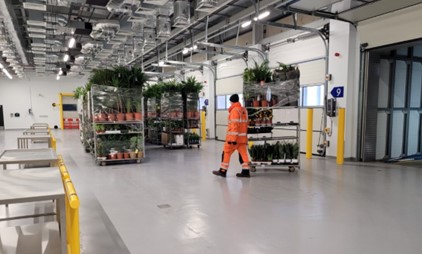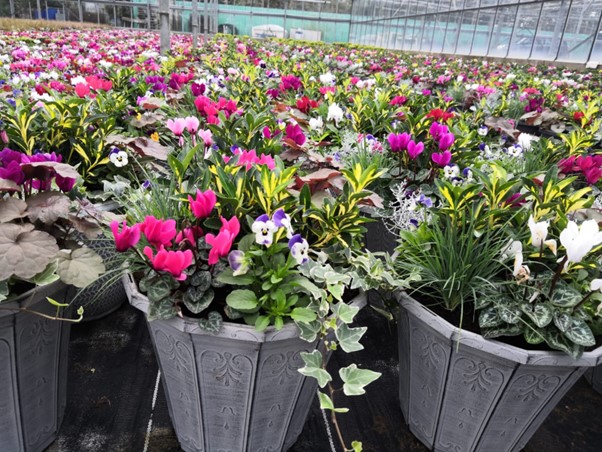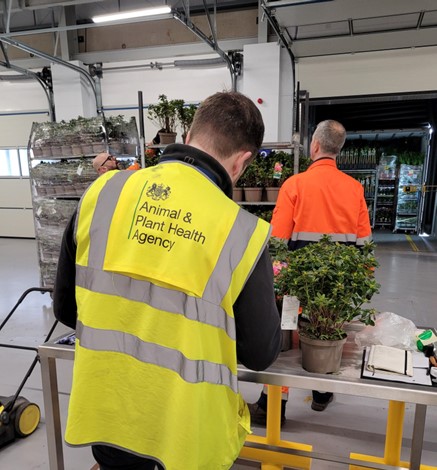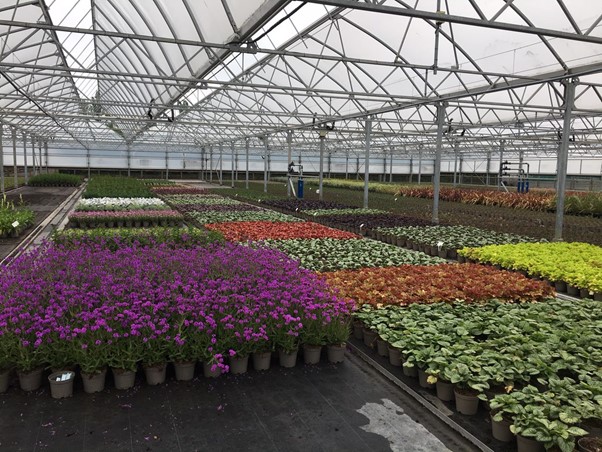Britain’s Environmental Horticulture and Gardening businesses are faced with uncertainties on crucial imports
A new border trade system failure would be disastrous for UK Horticulture, biosecurity and biodiversity, say The Horticultural Trades Association (HTA).
When the new Border Target Operating Model went live earlier this year, its impact on the environmental horticulture and gardening industry could not be underestimated. The Horticultural Trades Association (HTA), the representative trade body, has been at the forefront, raising serious concerns with Defra and APHA about its members' ability to trade smoothly with the continent’s producers of trees and plants. This trade helps to meet the demand of the 30 million passionate British gardeners for beautiful, healthy flora and the ambitions of the Environmental Improvement Plan. When Parliament returns the HTA have urged Defra to make resolving this issued a top priority.

So why is border trade so important?
79% of the UK’s tree and plant growers import plant material – this could be from young plug plants ready for propagation to mature trees. The largest suppliers are from the Netherlands, Italy, France, Germany and Spain.
Most UK Growers are SMEs, generational family businesses that trade in and serve rural areas across the country. They face a myriad of potential challenges to their plant production supply, including delays, extra costs, administration, IT system issues, staff focus away from production, damage to perishable goods, cross-contamination risk, and general uncertainty. These barriers could be fatal for many businesses.
HTA CEO Fran Barnes previously stated:
“Many across the sector still do not know, and will not know for some time, the full costs of imports and have any certainty to plan and manage cash flow, with a hotch-potch of pricing regimes and no publicly available data on inspection levels and trade routes. We are in the dark and unable to access the data the BTOM relies on.”
“The sector imports £753 million of plants and plant products annually. 90% of our growers import plants at some stage of the growing cycle. Nearly 100% are SMEs and, in theory, subject to 100% checks and charges. Today, they have near 0% access to the easements or alternatives to BCP usage. We continue to seek members’ insights into how the border and new BCP system is operating, what is working well and what is not, and the cost and resource implications.”
HTA Member Jonathan Whittemore of plant nursery Johnsons Nurseries, in Yorkshire, said:
“The impacts of the BTOM are many and varied, and the issues are complex. It is early days, and we know things will change, but I have no idea whether they will change for the better or worse. In terms of ease of trade with the EU, we are regressing rather than progressing, and it feels like we have jumped to new systems too soon – before the impact on UK businesses is understood. I am expecting to see an increase in transport costs of 20% through additional port charges and increases in costs from our haulage partner due to increased transit time. As things are, I am concerned about biosecurity and the reduction in the quality of the work that APHA is able to do when checking goods at the ports – even if the product is unloaded from the lorries, the ability to check plants thoroughly at the port is nothing like it is when the checks are done at the nursery with the combined expertise of Johnsons’ nursery staff and APHA inspectors.”

So what are the details for the horticulture industry and the issue of imports?
Plant goods are categorised as sanitary and phytosanitary (SPS) goods and are subject to the requirements for trading such material. In 2023, imported plant material was worth over £770m to the UK horticultural sector, with 99% of that coming from the EU.1 This import value represents around half of the value of the UK production sector for trees, plants, seeds & bulbs, which totalled £1.54bn p/a in 20222.
According to a recent survey of HTA members3, 79% of British plant and tree growers import, primarily from the EU. The plant material is sensitive, perishable, and crucial to the industry as much of it is ‘grown on’ by our domestic commercial nurseries for sale in the UK. Finished plants, seeds, bulbs and trees, ready for retail sale or planting in the wider landscape, are also imported. It is estimated that 70% (by volume) of the imported material is retail-ready4.
Between 2019 and 2022, exports of plants, trees, seeds, and bulbs to the EU fell by nearly 40% from a steady level of circa £33 million to £18.2 million due to restrictions imposed by the lack of a plant health agreement with the EU.5
Plants and plant products imported from the EU to Great Britain are categorised into high, medium, and low-risk categories. Plant health controls apply to imports of high—and medium-risk plants and plant products. All plants for planting, bulbs, and some seeds are high-risk and theoretically subject to 100% checks. These goods have been subject to checks at the Place of Destination (PoDs) and full documentary requirements since January 2021.
Since 30 April goods imported from the EU now have to stop at the border to receive their plant health check. The effectiveness of those checks remains in question, and we have many outstanding asks regarding the implementation of an effective trade border for the plant sector. Costs are already beginning to rise, and anecdotal evidence is coming thick and fast about systems not working properly, delays and damages, and drivers not wanting to drive plants to the UK and wait for hours on a dockside.
UK environmental horticulture SPS goods (i.e. high-risk plants and plant products) have been the most impacted and for the longest time by both processes and costs relating to trade changes resulting from the EU exit and continues to be so; this is a unique border for plant movements and must be understood when making decisions on border-related policies and changes.
The Netherlands acts as a source and centralised EU hub for plant material, accounting for £635m worth of UK plant imports in 2023 (well over 80%)6, although material is also sourced directly from other EU Member States such as Germany, Belgium, Denmark, Italy and France. Half of all imported plant material (by value)7 flows through the East of England seaports of Harwich and Felixstowe, and the bulk of the rest via Hull, Immingham or short straits routes (i.e. Dover), mainly via ‘Roll-on Roll-off’ (RoRo) ferries both as accompanied and unaccompanied freight.
Biosecurity is a top priority for the sector, and the recent Place of Destination (PoD) checks provided the industry with greater biosecurity than they are experiencing today. The HTA does not believe that the newly implemented border changes can achieve the level of the biosecurity supplied by the PoD system nor the ambition set out in the BTOM in the near or medium term without substantive change and investment, including in existing infrastructure and new systems, as well as delivery on alternatives to BCPs for plants.
While the most recent (30 April) border changes remain in the ‘early days’ despite being several weeks in, there is still no clear plan to exit the current ‘pragmatic approach’, and border biosecurity remains compromised in the effort to avoid any queues of lorries at Border Control Posts.
There is no certainty on the trajectory of increased border inspections, nor is there any visibility over whether system fixes on issues identified by the sector will be developed and implemented. Very little data is available to inform the industry, and nothing is being made publicly available on how the border is progressing. The industry seeks clarity on the pragmatic approach and the plan for exiting it.
98% of the HTA’s members are SMEs, and the sector remains largely fragmented. A survey of members in 2021 indicated that smaller member businesses (with a turnover of <£1m) that are importing plants/plant materials are also more likely to indicate a negative impact (88%) or major negative impact (28%) when thinking about changes to the way the UK trades with the EU.8
The most recent border changes have hit during peak season. In addition to other challenges, the increased costs of border operations, including the government-set Common User Charge (CUC), impact sector competitiveness and the ability to invest in growing businesses and increasing UK production output.
In addition to the immediate issues on border operations, the sector has identified some key mid-term actions, too, including addressing BCP capabilities to handle more complex loads, expediting easements such as the Authorised Operator Status (AOS) scheme, and Control Point (CP) specifications for the sector. However, we are concerned that the government lacks the resources, oversight, and long-term planning to deliver these in the needed timeframe.
What solutions can the next government implement?
Whilst the best outcome for the sector would be to negotiate and achieve an SPS agreement with the EU, the HTA understands this is not immediately achievable and supports the BTOM's ambition to be a world-class modern, digital and risk-driven border. However, given recent knowledge and experience, we believe this will be very difficult to achieve without substantive risk and cost to UK environmental horticulture.
Ensuring BCPs are retro-equipped to deal with the critical mass of plant consignments during peak season and that complex loads can be handled efficiently and biosecurely is an essential requirement.
The next government must work with industry to ensure Groupage works for all types and sizes of businesses, ensuring clarity of process and an understanding of the prevalence of groupage. SMEs must be able to access all methods of border crossings, ensuring easements are in place for this category—the main users of groupage.
Additionally, the technology must work and be clear to users. Border-related systems and processes must be integrated to smooth the import process while reducing administration from existing processes.
The muted Authorised Operator System can help alleviate many of the complexities and uncertainty for businesses, but this trusted trader scheme, when introduced, needs to be accessible for horticulture businesses, including the smallest, who want to participate.

Outlook
The border is not the only issue relating to trade impacting the sector. For example, CITES (Convention on International Trade in Endangered Species of Wild Fauna and Flora) and the Windsor Framework also have impacts and implications for trade.
The Horticultural Trades Association seeks a holistic government horticulture strategy, inclusive of trade and borders, to be delivered that supports growth in competitiveness and productivity of the UK sector.
Further information can be found here: https://hta.org.uk/policy/political-stakeholder-briefings
- Overseas trade statistics, HMRC, commodity codes: 0601 and 0602
- Horticulture statistics, Defra
- HTA Survey 2022
- HTA Survey 2022
- Overseas trade statistics, HMRC, commodity codes: 0601 and 0602
- Overseas trade statistics, HMRC, commodity codes: 0601 and 0602
- APHA Statistics, January 2023
- HTA Survey 2021 for “Let Britain Grow” Campaign
